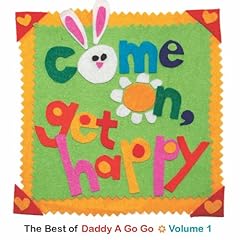I had never heard of Daddy a Go Go, the kiddie-rockin’ alter ego adopted by singer/songwriter/stay-at-home-dad John Boydston, before opening the envelope that contained Come On Get Happy, but that’s just simple ignorance on my part: Boydston has released six albums of kids’ music since 1998, won multiple awards, and earned press in publications like Newsweek and the Washington Post. For lucky album number seven, Boydston has decided to collect and remaster 15 of his greatest “hits,” including “Daddy’s Diaper Blues,” “I Think I Might Be a Dog,” “Nana Nana Boo Boo,” and “Pink Floyd Saves Hugh Manatee,” a song so stupidly titled I almost threw away the CD.
I’m glad I didn’t, because Come On, Get Happy is really pretty charming. My friend the Lovely Mrs. Davis has designated Boydston a member of the “goofy dads” genre, which is true, I guess, except that I find Daddy a Go Go a lot less goofy than much of the kids’ music I listen to. And really, pretty much the entire genre is goofy — some of it is obnoxiously overt, and some of it is less caffeinated, but I don’t think I’ve listened to a single children’s album that didn’t make liberal use of cornball humor. In that context, Come On, Get Happy is really pretty sedate; musically, I’d liken it more to NRBQ than most children’s music (and yes, I’m aware that the Q has released a kids’ record). Given that I’m a huge NRBQ fan, it should come as no surprise that I really enjoyed most of these songs (notable, unsurprising exception: “Pink Floyd Saves Hugh Manatee”) — they have the pleasantly lo-fi production aesthetic of a lot of the great old indie rock records of the ’80s, which is weird, given that Boydston didn’t start recording them until the ’90s, but whatever. The album also highlights Boydston’s taste in covers, which ranges from the obvious (the title track) to the wonderfully semi-obscure (Harry Nilsson’s “Best Friend”). Continue reading
 Daddy a Go Go – Come On, Get Happy: The Best of Daddy a Go Go, Volume 1 (2009, Boyd’s Tone)
Daddy a Go Go – Come On, Get Happy: The Best of Daddy a Go Go, Volume 1 (2009, Boyd’s Tone)